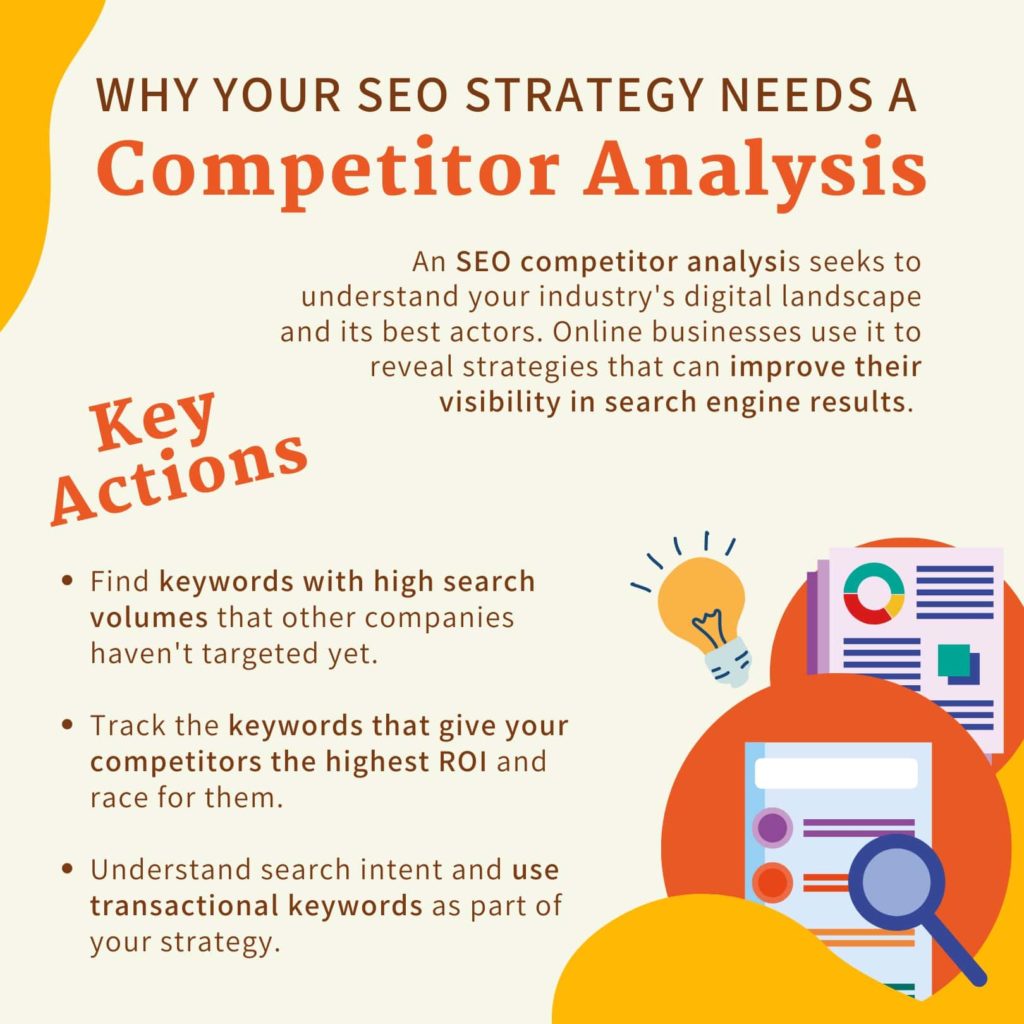
An SEO competitor analysis seeks to understand your industry’s digital landscape and its best players. This type of data is widely employed by SEO experts to reveal strategies that can improve your own Google ranking! Although it’s sometimes referred to as a competitor keyword analysis in SEO, it involves much more than compiling a list of keywords.
But is it that important?
Well, a good look at the eCommerce business environment will clarify that question. In recent years, the online marketplace has turned into a winner-takes-all environment. The stakes are high, and the winning Google spots are scarce and hard to reach without a master plan. According to Ahrefs, the top 3 Google search results get more than 75% of all clicks. And, in eCommerce, this high-volume organic traffic ultimately translates to valuable leads and online customers.
If your business website has been live for quite some time, but you haven’t yet noticed a spike in visitors, you might have forgotten to complete one of your most important marketing tasks: the notorious SEO competitor analysis!
What is a Competitor Analysis?
The competitor analysis represents an invaluable marketing and business management tool for researching your competitors in a more structured way. In brief, it lets you assess and use the strengths and vulnerabilities of businesses that sell similar products and target the same market segment. Knowing your competition allows you to create and enhance your own strategy.
Despite its invaluable impact, it’s well known that most online companies do not perform this type of analysis thoroughly or, worse yet, at all.
Why Do eCommerce Businesses Need a Competitor Analysis?
Why is this method is essential to any eCommerce business regardless of its state of development? On top of gathering valuable data on other players in the industry, a competitor analysis generates actionable insights for driving a successful marketing strategy. It also helps businesses reassess underperforming plans to derive clear results and set better KPIs. But that’s not all! The competitor analysis can also aid your business in several other meaningful ways:
- Design products in a way that stands out from the competition
- Fine-tune your sales strategy and sales approach
- Optimize your website to better meet customers expectations
- Get a better understanding of evolving market trends and how to use them to your advantage
Does it Have Anything to Do with SEO?
Yes, a business’s SEO strategy and competitor analysis are intrinsically connected. The whole point of search engine optimization (particularly for eCommerce purposes) is to help websites rank better. Of course, this often translates to “higher than the competition.”
Therefore, a competitive analysis learns from top-ranking sites and looks for possible gaps that your business can use to get ahead.
In layman’s terms, by understanding your industry’s digital landscape and its players, you can reveal the very strategies capable of improving your own spot in the SERPs (Search Engine Result Pages). It’s a bit like reverse engineering someone else’s path to success to gain actionable insights into how to trace your own.
What is a Competitor Keyword Analysis?
The competitor keyword analysis is one of the main components of an SEO competitor analysis, but definitely not its only one. Also known as a keyword gap analysis, it refers to the process of discovering valuable keywords that your audience uses and your competitors rank for. If you’re not sure what to make of that sentence, head to this blog covering how website keywords “work.”
According to SEO expert Neil Patel, your competitive analysis should include:
- Find keywords with high search volumes that other companies haven’t targeted yet. The search volume is a metric for how many people are searching for a particular query on the internet.
- Track the keywords that give your competitors the highest ROI (return on investment) and race for them. These keyphrases are most likely to be used by potential customers and bring in revenue. Hence, they are extremely valuable!
- Know the search intent behind all of the keywords you target, and make sure to use transactional keywords in your strategy. These are terms used by customers already interested in making a purchase (e.g., “buy wholesale produce online”).
What are The Best SEO Competitor Analysis Tools?
Many powerful tools leverage artificial intelligence to maximize the efficiency and accuracy of the SEO competitor analysis. Some of these tools include countless other functions crucial to your website’s SEO strategy. Of course, this also makes them very costly!
Without further ado, some of the most popular SEO competitor analysis tools are:
- SEMrush
- Ahrefs
- Backlinko
- Ubersuggest
- Keyword Surfer
- Google Search Console
- SimilarWeb
- Answer the Public
However, purchasing the best industry tools created and used by the world’s top experts isn’t enough. You’ll need to understand how to properly operate and calibrate them to meet your business needs. In short, you’ll still need an SEO specialist to generate, implement, and adjust your strategy. And that strategy is based, among other things, on a thorough analysis of your online competition.
Takeaways

Over time, using a competitor analysis as part of your SEO strategy will boost your Google ranking, leading more clients to your website or eCommerce platform. But, as we have pointed out, there are many components (of on-page, off-page, and technical SEO) that you must handle as part of your website’s search health. Additionally, both the tools and in-house experts are expensive and hard to acquire.
The good news is that hiring a digital agency can drastically cut these costs and generate the meaningful benefits you haven’t drawn yet from your eCommerce efforts. So if you need a digital expert in the food industry to help you learn about your digital competitors and build a growth-oriented strategy, then be sure to reach out!


